Indie vs Twindie - Why working on a game with another person is awesomeFor the last year, I have worked as a sole trader building games for a living. This summer I had the opportunity to work with a traditional artist to build a video game called CHIGUN. Here is a reflective comparison between working alone and together.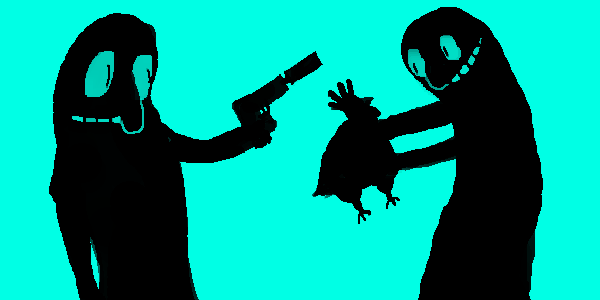 My first involvement in designing a game was at University.
My first involvement in designing a game was at University.Whilst it was a thoroughly enjoyable experience designing characters and artwork for the game, relying on others meant that the project didn't get done. This was consistent each year until I had enough and decided to just develop my own games instead. I produced all the artwork and programming for each project and the result was I actually started getting games pumped out, instead of "some nice artwork and a couple of dodgy prototypes" for a years work. As of September last year, I started up my own business and continued development on projects as a sole trader, doing all roles myself with the exception of outsourcing the music for my games.
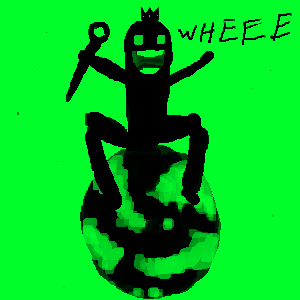 Here are some of the benefits that came from doing this:
Here are some of the benefits that came from doing this:1. 100% of the profits - working alone means if you build everything, you get everything.
2. Full creative freedom - Whatever crazy idea for a project popped into my head e.g. Sword swallowing sword fight, I could develop without being shot down by others.
3. Doing everything yourself means you don't have to rely on others and you know the work will get done.
4. You have to do many more jobs, so you learn a plethora of skills.
5. You don't have anyone to support so as long as you can sustain yourself, you can take all the time you need with your projects.
6. You don't have to pay any staff!
7. Completing a project all by yourself is a massive achievement.
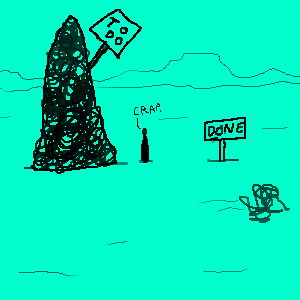 Despite the benefits of building my own products, there came a variety of drawbacks and counter arguments for the above:
Despite the benefits of building my own products, there came a variety of drawbacks and counter arguments for the above:1. All on you: whilst learning new skills is great, there is a lot to do in games development. There is a often a feeling of being overwhelmed with the variety and urgency of things to do.
2. Working alone: being the only one working on a project means you miss out on a large quantity of the best part- sharing the experience of building a game with someone else.
3. Doing everything yourself means that you can't rely on others to lighten the workload.
4. Although there is just you to sustain, the lack of workforce means that projects take longer to develop, offsetting the living costs of having another person. Although Narcissus so far has been well received, the project has taken 3 years to finish.
5. Having full creative freedom meant I would work on other projects that popped into my head instead of maintaining the discipline to focus on current ones.
6. It's a lot harder to justify to people that the work you are doing is genuine if it's just you (Just a unsociable nerd in his room).
One thing that came to mind whilst writing this list was the reasons for working alone are mostly down to selfishness and greed. I really had to think hard to try and think of positive reasons to work on projects alone, but there really isn't many. There was a wonderful TED talk I watched recently about how investing in others provided a greater satisfaction than the option of a selfish investment. I wonder if the same applies for games development...
This summer, I went to the states again and was reunited with an old friend, Tyler Giordano. During a night out to catch up on what either of us had been up to in the last year, the subject of video games came up. We'd worked on projects together before in the past (A 60ft festival poster made up from sheets of standard office paper) and after several more drinks we agreed it'd be a smart idea to build a video game together (essentially dooming the pair of us to a cold windowless room for the rest of the summer).
CHIGUN was the idea that we went with; a short but sweet 5 stage battle arena game in which you are a chicken who pecks up bullets and launches them from the pistol that you hold in your genetically modified comb hand.
Having been through the process of working with Tyler on the project, coming up with reasons to collaborate with another individual was easy to do: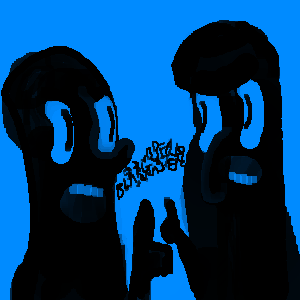 Arguing is good
Arguing is goodWhilst working with another may deny you total creative control, having to discuss and argue your vision with another individual means you actually have to fight and justify each idea you have. This sounds like a disadvantage, but it means only the best ideas make it into the final product and it improves your negotiation skills. Tyler and I arguing over features was a day to day routine, but the blend of Tyler's unchained creative mind and my technically realistic mind got just the right balance of insane stuff (that I probably would have thought impossible in the software) and sane technical stuff (that still allowed the game to run smoothly).
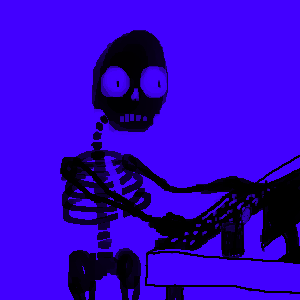 Your Teamate Sure Looks Thin...
Your Teamate Sure Looks Thin...Working with another person drives you forward since you're aware that the other person has to eat. In the situation that me and Tyler were working together we had catering included, but if CHIGUN flopped it would be much harder to justify building another game (since for us to continue building video games, we want to move Tyler to the UK so we can work in the same office space).
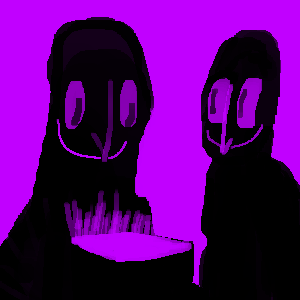 Sharing Awesome Stuff
Sharing Awesome StuffTo accompany the financial drives, there's also the enthusiasm of the other individual. We would set each other objectives and then re-convene to see what we had created - usually mutually blowing each others minds with the likes of painted dancing chickens and programmed hologram effects. It'd be a treat to create cool stuff just to see the reaction of the other person - you'd see a little motivation bar above their head fill back up to the top and you'd spend the rest of the evening hammering on with work with big stupid grins on your faces.
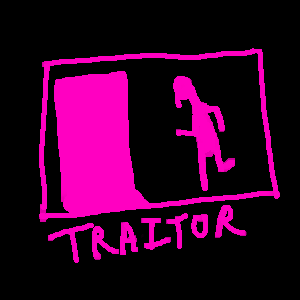 The Old "Shift Guilt Trip Trick"
The Old "Shift Guilt Trip Trick"Additionally, working in an office environment, if you're working alone you can leave whenever you want, but if you're in a team, nobody wants to be that guy that leaves early so you tend to work for longer hours together e.g. 6pm till 2am every night. Whilst this means your hours go up, so much gets done!
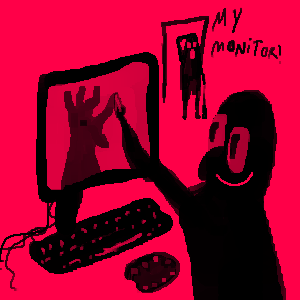 Sharing of Knowledge, Skills and Culture
Sharing of Knowledge, Skills and CultureWorking with another person gives you entirely new skills and interests.
a. Before the project, Tyler had never worked in the games industry before and had very little knowledge of modern video games. From working on CHIGUN, he gained a greater understanding for technical constraints of building video games. Normally he works in traditional painting and sculpture, so he had to learn how the audience in the games industry consume and interact with media compared to in the art world e.g.
Optimization of artwork isn't an issue in the art world, but is essential in the games industry. Also with his understanding of cinematography, having to learn how the dynamic structure of video games differed from the linear structure of film. Working on CHIGUN also got the chance to show him other games with other artistic styles that appealed to him.
b. Before working on CHIGUN, I had focused my games (like many game developers) towards using pixel art. Originally Narcissus featured hand painted visuals, but when redesigning artwork hindered the level design iteration process, I moved away from traditional methods and used simple placeholder artwork. When me and Tyler started working together, the prospect of moving back to highly stylized artwork was daunting, but by doing so breathed new life into the games development process. I also learnt about traditional painting, composition and colour theory from Tyler along with finding out about lots of amazing artists/musicians. Constructing all of the assets for CHIGUN out of bits and bobs from around the place and working in a bunch of different mediums introduced new challenges for me to tackle.
Without making the decision to work with Tyler, I wouldn't have taken that step out of the comfort zone and the game would likely not be a 10th as visually insane as what you see today.  The Outcome of CollaborationThe result of the above meant CHIGUN was built in two and a half months, compared to Narcissus plodding on in development for 3 years.
The Outcome of CollaborationThe result of the above meant CHIGUN was built in two and a half months, compared to Narcissus plodding on in development for 3 years. It blew my mind how quickly the project came together, especially since we were able to document the development process simultaneously
In short, if you team up with another person,
you get 50% of the pie, but it's a much tastier pie. Even though you have to give up a decent share of the game profits for working with another person, the difference that makes to the quality of the game offsets the money you would lose. Not to mention that the reason you give up that money is so you can keep working with that person on projects!
Along with financial value, the shared experience of building a video game together holds enough value in itself for enriching a friendship.When Tyler is finished with his masters, we plan to continue building games together and with the blend of our very different minds should continue to operate as a far more functional team than I alone.
Thank you for reading the article! I hope that many of you working together can appreciate some of the comments made in it and as for those working alone, you'll consider collaborating.
 Community
Community Townhall
Townhall Forum Issues
Forum Issues Archived subforums (read only)
Archived subforums (read only) Creative
Creative Indie vs Twindie - Why working on a game with another person is awesome
Indie vs Twindie - Why working on a game with another person is awesome Community
Community Townhall
Townhall Forum Issues
Forum Issues Archived subforums (read only)
Archived subforums (read only) Creative
Creative Indie vs Twindie - Why working on a game with another person is awesome
Indie vs Twindie - Why working on a game with another person is awesome
